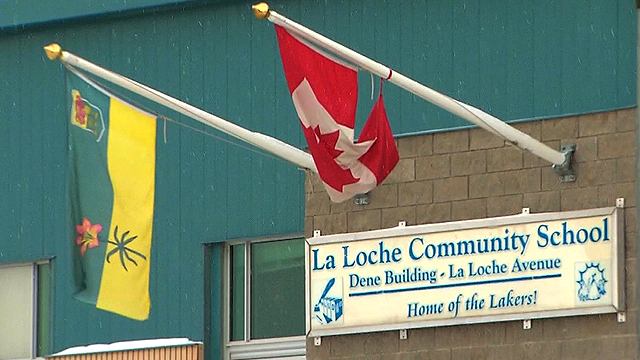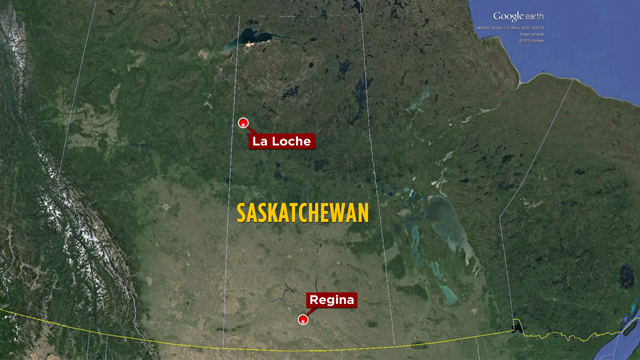
After a rapid surge in cases, the incident commander coordinating northern Saskatchewan’s pandemic response says he expects the curve to rise in the coming weeks, while the region’s MP calls it “the most concerning outbreak of COVID-19 in Indigenous communities in Canada.”
Rick Laliberte answered the phone to report an outbreak in Beauval, which is where he leads the Incident Command Centre (ICC) for 24 First Nations, Metis and municipal communities in the remote primarily-Indigenous region.
“Straight up. It’s going straight up,” Laliberte said. “My community is from zero on Sunday to five today, and it goes exponentially?”
As of May 1, there were 77 positive cases (68 of them active) and two deaths in northern Saskatchewan according to provincial data.
The novel coronavirus spread quickly after an asymptomatic individual returned with the virus to the village of La Loche from the Kearl Lake oilsands mine in Alberta over the Easter weekend, Laliberte explained.
Eighty-three workers connected to the mine had tested positive as of this posting.
The individual stopped for two days in Patuanak, where the English River First Nation is located, on the way. Five members of a 15-person household soon tested positive and are now in isolation, Laliberte said.
The individual then proceeded to their primary residence in La Loche where the pathogen spread to the adjacent Clearwater River Dene Nation.
On April 29, news broke that an individual at the Beauval General Store tested positive. Laliberte reported that workers and customers have also contracted the virus, bringing the total number to five.
“We are all concerned. We are going into a total lockdown down today. Totally opposite from what the province is doing with the reopening strategy,” Laliberte said.
“It’s a recipe for an outbreak. If you send all the patients home with houses that are up to 15 people, that’s a household outbreak. And if you let people serve themselves – go get mail or go get water – then it’s an outbreak in your community. We’re trying to contain it. We have to contain this: contain, isolate, early identify.”
APTN News last spoke with Laliberte on April 17 – just before the outbreak – when he explained the ICC came together to maximize limited regional resources and increase inter-jurisdictional cooperation. Now he wants to take another step, calling for the creation of a Treaty 10 pandemic council.
“If you respond under a treaty boundary area it would make a whole lot of sense, because under treaties pestilence and famine are included. So everybody’s in there. We’re embracing everybody. It’s not just the Indigenous population. We’re caring for everybody in this region.”
(An outbreak La Loche has spread the novel coronavirus to nearby Indigenous communities. Photo APTN file)
Read more: North Saskatchewan communities set up COVID-19 command centre due to government ‘negligence’
Northern Saskatchewan MP Gary Vidal said “the spread has been dramatic and rapid,” during a special virtual meeting of the federal Standing Committee on Indigenous and Northern Affairs (INAN) that dealt with how Canada has responded to the needs of First Nation, Metis and Inuit communities.
“The fear is real,” he added, before asking what steps Ottawa is taking to contain the spread.
“It’s too late for reactive measures. Now’s the time for a major proactive response from ISC in northern Saskatchewan. This has become a very dangerous situation for all of us in northern Saskatchewan,” he said.
ISC’s chief medical officer replied that Ottawa is working with Public Health Agency of Canada (PHAC), Saskatchewan and local health authorities to provide additional surge capacity, ship personal protective equipment (PPE) and increase testing capacity by sending point-of-care rapid testing equipment.
“We are fully behind the communities in providing those supports, including public health measures such as isolation, such as physical distancing, such as contact tracing,” said Dr. Tom Wong.
Laliberte noted that money from the Indigenous Community Support Fund enabled the Metis Nation Saskatchewan and local First Nations to take early action. But he remains critical of the provincial response.
“The province has been slow off the hop. We’ve been asking for supports since March 30 when we instituted the incident command, and to this day they’re still not fully engaged with us. They’re very elusive,” he said.
Despite the outbreak, Laliberte said the communities plan to stay course and focus on containment.
“What we’ve been doing in preparing was the right strategy. Because if we weren’t ready, this outbreak would be much worse right now. And we’re responding accordingly. We’re going into a community lockdown. All our communities are stopping inter-community travel starting today for 14 days.”
There were 415 cases province-wide with 6 deaths as of this posting.











